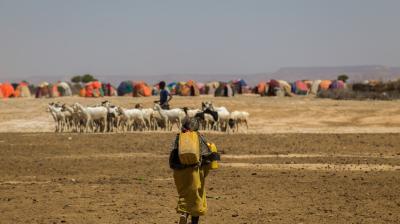Climate Security and the Military: Concepts, Strategies, and Partnerships
At the start of each academic year, the Faculty of Military Sciences (FMS) at the Netherlands Defence Academy releases the Netherlands Annual Review of Military Studies (NL ARMS), presenting a segment of its research activities centered around an urgent theme. Climate change and the associated energy transition stand as prominent among these urgent themes, touching our society daily and demanding comprehensive examination due to their multifaceted scientific nature. This volume, however, focuses specifically on the military scientific perspective.
Clingendael researchers Sarah Lokenberg, Louise van Schaik, and Saskia Hollander contributed chapter 6 'Low Lands, High Stakes: How the Dutch Navigate Climate Security'.
Summary book
The 2023 NL ARMS publication, titled 'Climate Security and the Military: Concepts, Strategies, and Partnerships' examines the climate security nexus from a military standpoint. It proposes the design of climate security strategies and explores how they can contribute to adaptation and mitigation of the related challenges. Part 1 reviews the understanding of the Climate Security Nexus. Subsequently, Part 2 assesses the potential design of climate security strategies. In Part 3, adaptation to climate change by the military is reviewed. Finally, part 4 discusses the potential contribution of the military to climate mitigation from the angle of operations on land, at sea and in the air, and of solar geoengineering. By analysing the impact climate has on security around the world and military operations, this book provides a unique and much needed view on the mutual influence of climate security and the military and provides suggestions to adapt to and mitigate the resulting challenges.
Chapter 6: Low Lands, High Stakes: How the Dutch Navigate Climate Security
By Sarah Lokenberg, Louise van Schaik, and Saskia Hollander
The security implications of climate change shape the strategic environment of the Netherlands. Climate change impacts increase resource competition and manipulation, disrupt critical infrastructures, and affect military operations and capabilities. The energy transition that is catalysed by climate mitigation policies in turn has its own geopolitical implications as it affects the energy security positions of countries. These strategic security effects mean that the Dutch government cannot overlook the importance of climate security. Followed by an analysis of how climate security is featured in Dutch strategies and policies, this chapter proposes specific entry points for synthesising climate security through a 3D approach, by integrating it into development, diplomacy and defence activities. It moreover points to the need to consider the security and conflict risk dimension more prominently in its international climate action too.








